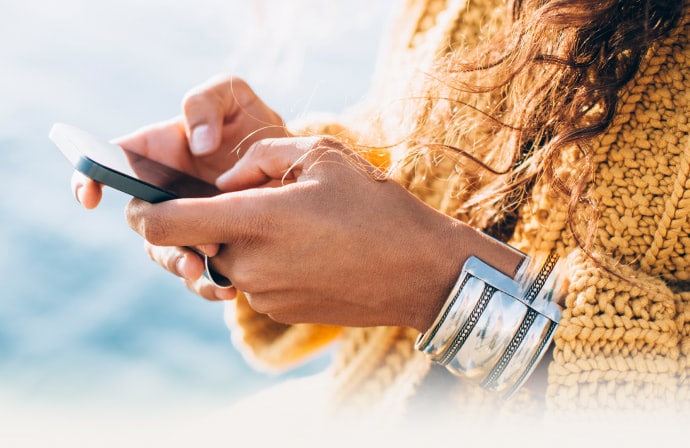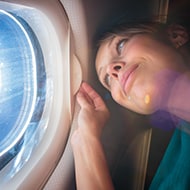Q&A: Is it safe to connect to airplane Wi-Fi while traveling?
Using in-flight Wi-Fi could expose your personal information. A VPN can make it safer to use inflight Wi-Fi, or any other public Wi-Fi, while you're traveling.

Question: I’m throwing my laptop, tablet, and smartphone into my “personal item” and getting set for some summer travel. I’m ready to relax, but should I be concerned about connecting to airplane Wi-Fi when I fly?
Answer: Relaxation is a good idea, but don’t be too quick to relax about your Wi-Fi connection in flight. Inflight Wi-Fi is far from secure — and cybercriminals can target Wi-Fi networks used by travelers. In fact, they count on tourists getting into "vacation mode" and letting down their guard.
Why is unprotected in-flight Wi-Fi a bad idea? Here are two reasons.
One, hackers could access your connection while on public Wi-Fi and steal the private information you transmit, from bank account numbers to email messages and social media passwords. This might enable them to steal your money or take over your accounts.
Two, you could pick up a virus or malware that could infect your device and cause headaches for you long after you've landed.
It’s a good idea to avoid airplane internet if you can. It can be expensive, and the connection is often spotty at best. If you do connect, don't make any sensitive transactions, such as checking your bank balance or logging into your email.
If you can't live without Wi-Fi while you're in the air, consider getting a virtual private network. A VPN can make it safer to use inflight Wi-Fi, or any other public Wi-Fi connection, while you're traveling. And practicing Cyber Safety is the first step toward a truly relaxing trip.
FAQs about airplane Wi-Fi
You might have other questions about Wi-Fi on airplanes. Here are the answers to some frequently asked questions.
How do planes connect to Wi-Fi?
Airplanes connect to Wi-Fi in two different ways: via cell towers and via satellite networks. When flying over land, planes typically connect to Wi-Fi by using an antenna underneath the plane that connects to cell towers. When flying over the ocean, planes usually connect to Wi-Fi using an antenna on top of the plane that connects to satellites orbiting the earth.
How does airplane Wi-Fi work?
Airplane Wi-Fi works by connecting either to cell towers or satellites via antennae that send out signals to these devices. As the plane flies, it will continuously send signals, connecting to whichever cell tower or satellite is closest. This activity turns the plane into a Wi-Fi "hotspot" that allows passengers to surf the internet, stream movies, or do other activities online.
Can you use a VPN with airplane W-Fi?
You can use a virtual private network (VPN) for added security when using airplane Wi-Fi. But using a VPN in the air isn't 100 percent foolproof. That's because your VPN can get momentarily "dropped" during a flight, leaving an entryway for hackers. That's why avoiding airplane Wi-Fi is the only sure way to stay secure.
How do you keep your info safe while using a plane's Wi-Fi?
Use airplane Wi-Fi only for actions that won't reveal any of your private data, such as reading the news or watching a movie. If you need to do work that could put your passwords and other private information at risk, such as logging into your email or social media accounts, use a virtual private network (VPN.) But keep in mind that VPN service can be spotty in the air and is not a guarantee of security.
Does airplane Wi-Fi work over the ocean?
Airplane Wi-Fi can work over the ocean, but the plane has to use a different method than the one used over land. Over large bodies of water, a plane will connect to satellites that in turn connect to ground stations. You may notice slight delays when using Wi-Fi while traveling over the ocean.
Can airplane Wi-Fi be hacked?
Airplane Wi-Fi is fairly easy to hack and makes an attractive target for cybercriminals. That's because hackers know that travelers tend to get relaxed and may neglect to follow security measures they use at home. The best way to avoid falling victim to these hackers is to decline airplane Wi-Fi service.
How much does airplane Wi-Fi cost?
Airplane Wi-Fi typically costs between $5 and $12 for a one-hour pass, though some airlines offer free Wi-Fi or free in-air messaging via WhatsApp or other apps. Airlines price and sell Wi-Fi differently. Many offer hourly passes, day passes, and monthly passes.

The freedom to connect more securely to Wi-Fi anywhere
With Norton™ VPN, check email, interact on social media and pay bills using public Wi-Fi without worrying about cybercriminals stealing your private information
Try Norton VPN for peace of mind when you connect online
Editorial note: Our articles provide educational information for you. Our offerings may not cover or protect against every type of crime, fraud, or threat we write about. Our goal is to increase awareness about Cyber Safety. Please review complete Terms during enrollment or setup. Remember that no one can prevent all identity theft or cybercrime, and that LifeLock does not monitor all transactions at all businesses. The Norton and LifeLock brands are part of Gen Digital Inc.





Want more?
Follow us for all the latest news, tips, and updates.